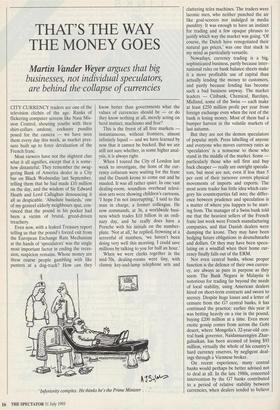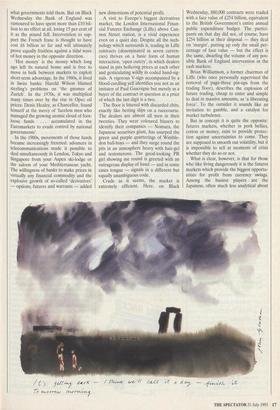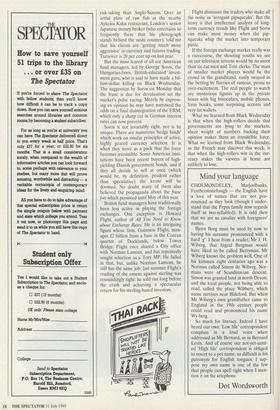THAT'S THE WAY THE MONEY GOES
Martin Vander Weyer argues that big
businesses, not individual speculators, are behind the-collapse of currencies
CITY CURRENCY traders are one of the television clichés of the age. Ranks of flickering computer screens like Nasa Mis- sion Control, shouting youths with their shirt-collars undone, cocksure pundits posed for the camera — we have seen them every day this week, as market pres- sure built up to force devaluation of the French franc.
Most viewers have not the slightest clue what it all signifies, except that it is some- how distasteful. They remember the swag- gering Bank of America dealer in a City bar on Black Wednesday last September, telling them that he had made f10 million on the day, and the wisdom of Sir Edward Heath and Lord Callaghan denouncing it all as despicable. 'Absolute bastards,' one of my genteel elderly neighbours spat, con- vinced that the pound in his pocket had been a victim of brutal, greed-driven treachery.
Even now, with a leaked Treasury report telling us that the pound's forced exit from the European Exchange Rate Mechanism at the hands of 'speculators' was the single most important factor in ending the reces- sion, suspicion remains. Whose money are these coarse people gambling with like punters at a dog-track? How can they know better than governments what the values of currencies should be — or do they know nothing at all, merely acting on herd instinct, machismo and fear?
This is the freest of all free markets instantaneous, without frontiers, almost infinitely liquid — and we have learned by now that it cannot be bucked. But we are still not sure whether, in some higher anal- ysis, it is always right.
When I toured the City of London last week to investigate, the lions of the cur- rency coliseum were waiting for the franc and the Danish krone to come out and be mauled. It was all rather quiet. In one vast dealing-room, soundless overhead televi- sion sets were showing children's cartoons. `I hope I'm not interrupting,' I said to the man in charge, a former colleague. He now commands, at 36, a worldwide busi- ness which trades $10 billion in an ordi- nary day, and he really does have a Porsche with his initials on the number- plate. 'Not at all,' he replied, frowning at a screenful of numbers, 'we haven't been doing very well this morning. I could save millions by talking to you for half an hour.'
When we were clerks together in the mid-70s, dealing-rooms were tiny, with clumsy key-and-lamp telephone sets and `Inferiority complex. He thinks he's the Prime Minister . . clattering telex machines. The traders were laconic men, who neither punched the air like goal-scorers nor indulged in media punditry. It was enough to have an instinct for trading and a few opaque phrases to justify which way the market was going. 'Of course, the Dutch have renegotiated their natural gas prices,' was one that stuck in my mind as particularly versatile.
Nowadays, currency trading is a big, sophisticated business, partly because inter- national rules on bank balance sheets make it a more profitable use of capital than actually lending the money to customers, and partly because lending has become such a bad business anyway. The market leaders — Citibank, Chemical, Barclays, Midland, some of the Swiss — each make at least £250 million profit per year from foreign exchange even when the rest of the bank is losing money. Most of them had a bumper harvest in the volatile markets of last autumn.
But they are not the demon speculators of popular myth. Press labelling of anyone and everyone who moves currency rates as `speculators' is a nonsense to those who stand in the middle of the market. Some particularly those who sell first and buy back cheaper — really are outright specula- tors, but most are not, even if less than 5 per cent of their turnover covers physical movements of imports and exports. The most acute trader has little idea which cate- gory his counterparties fall into; the differ- ence between prudence and speculation is a matter of where you happen to be start- ing from. The manager of a Swiss bank told me that the heaviest sellers of the French franc last week were French manufacturing companies, and that Danish dealers were dumping the krone. They may have been hedging future obligations in deutschmarks and dollars. Or they may have been specu- lating on a windfall when their home cur- rency finally falls out of the ERM.
Not even central banks, whose proper function is the defence of their own curren- cy, are always as pure in purpose as they seem. The Bank Negara in Malaysia is notorious for trading far beyond the needs of local stability, using American dealers hired on short-term contracts and sworn to secrecy. Despite huge losses and a letter of censure from the G7 central banks, it has continued the practice: earlier this year it was betting heavily on a rise in the pound, buying £200 million at a time. Even more exotic gossip comes from across the Gobi desert, where Mongolia's 32-year-old cen- tral bank governor, Naidansurengiyn Zhar- galsaikan, has been accused of losing $93 million, virtually the whole of his country's hard currency reserves, by negligent deal- ings through a Viennese broker.
On recent experience, many central banks would perhaps be better advised not to deal at all. In the late 1980s, concerted intervention by the G7 banks contributed to a period of relative stability between currencies, when dealers tended to believe what governments told them. But on Black Wednesday the Bank of England was rumoured to have spent more than El 0 bil- lion to no effect at all, losing 15 per cent of it as the pound fell. Intervention to sup- port the French franc is thought to have cost £6 billion so far and will ultimately prove equally fruitless against a tidal wave of hot money in the opposite direction.
`Hot money' is the money which long ago left its natural home and is free to move in bulk between markets to exploit short-term advantage. In the 1960s, it lived in Swiss banks: Harold Wilson blamed sterling's problems on 'the gnomes of Zurich'. In the 1970s, it was multiplied many times over by the rise in Opec oil prices: Denis Healey, as Chancellor, found himself at the mercy of 'faceless men who managed the growing atomic cloud of foot- loose funds . . . accumulated in the Euromarkets to evade control by national governments'.
In the 1980s, movements of those funds became increasingly frenzied: advances in telecommunications made it possible to deal simultaneously in London, Tokyo and Singapore from your Aspen ski-lodge or the saloon of your Mediterranean yacht. The willingness of banks to make prices in virtually any financial commodity and the explosive growth of so-called 'derivatives' — options, -futures and warrants — added new dimensions of potential profit.
A visit to Europe's biggest derivatives market, the London International Finan- cial Futures Exchange (Liffe) above Can- non Street station, is a vivid experience even on a quiet day. Despite all the tech- nology which surrounds it, trading in Liffe contracts (denominated in seven curren- cies) thrives on a basic form of human interaction, 'open outcry', in which dealers stand in pits hollering prices at each other and gesticulating wildly in coded hand-sig- nals. A vigorous V-sign accompanied by a blood-curdling yell identifies you not as an imitator of Paul Gascoigne but merely as a buyer of the contract in question at a price of which the last digit is a two.
The floor is littered with discarded chits, exactly like betting slips on a racecourse. The dealers are almost all men in their twenties. They wear coloured blazers to identify their companies — Nomura, the Japanese securities giant, has usurped the green and purple quarterings of Wimble- don ball-boys — and they surge round the pits in an atmosphere heavy with hair-gel and testosterone. The good-looking PR girl showing me round is greeted with an outrageous display of hand — and in some cases tongue — signals in a different but equally unambiguous code.
Crude as it seems, the market is extremely efficient. Here, on Black Wednesday, 880,000 contracts were traded with a face value of £254 billion, equivalent to the British Government's entire annual public expenditure budget. The partici- pants on that day did not, of course, have £254 billion at their disposal — they deal on 'margin', putting up only the small per- centage of face value — but the effect is the same, dwarfing the volume of any pos- sible Bank of England intervention in the cash markets.
Brian Williamson, a former chairman of Liffe (who once personally supervised the removal of page-three pin-ups from the trading floor), describes the explosion of future trading, cheap to enter and simple to deal in massive amounts, as 'a liberating force'. To the outsider it sounds like an invitation to gamble, and a catalyst for market turbulence.
But in concept it is quite the opposite: futures markets, whether in pork bellies, cotton or money, exist to provide protec- tion against uncertainties to come. They are supposed to smooth out volatility, but it is impossible to tell at moments of crisis whether they do so or not.
What is clear, however, is that for those who like living dangerously it is the futures markets which provide the biggest opportu- nities for profit from currency swings. Among the busiest players . are the Japanese, often much less analytical about
risk-taking than Anglo-Saxons. Over an artful plate of raw fish at the nearby Aykoku Kaku restaurant, London's senior Japanese money broker (who entertains so frequently there that his photograph stands behind the sushi counter), told me that his clients are 'getting much more aggressive' in currency and futures trading. Turnover is 20 per cent up on last year.
But the most feared of all are American fund managers, led by George Soros, the Hungarian-born, British-educated invest- ment guru, who is said to have made a bil- lion-dollar killing on Black Wednesday. The suggestion by Soros on Monday that the franc is due for devaluation set the market's pulse racing. Merely by express- ing an opinion he may have narrowed the odds on a final disintegration of the ERM, which only a sharp cut in German interest rates can now prevent.
Soros is not invariably right, nor is he unique. There are numerous 'hedge funds' which work on similar principles of active, highly geared currency selection. It is when they move as a pack that the force becomes irresistible. Some American insti- tutions have been recent buyers of high- yielding Danish government bonds, and if they all decide to sell at once (which would be, by definition, prudent rather than speculative) the krone will be doomed. No doubt many of them also believed the propaganda about the franc fort which persisted until May of this year.
British fund managers have traditionally been less active in playing the foreign exchanges. One exception is Howard Flight, author of All You Need to Know about Exchange Rates. He is an intriguing figure whose firm, Guinness Flight, man- ages £2 billion from a base in the Conran quarter of Docklands, below Tower Bridge. Flight once shared a City office with Norman Lamont, and has repeatedly sought selection as a Tory MP. He failed in that, but, unlike Norman Lamont, he still has the same job: last summer Flight's reading of the omens against sterling was resoundingly right: he sold out long before the crash and achieving a spectacular return for his sterling-based investors.
Flight dismisses the traders who make all the noise as 'arrogant pipsqueaks'. But the irony is that intellectual analysts of long- term currency trends like Flight and Soros can make most money when the pip- squeaks whip the market into temporary panic.
If the foreign exchange market really was a racecourse, the shouting youths we see on our television screens would be no more than tic-tac men and Tote clerks. The mass of smaller market players would be the crowd in the grandstand, easily swayed in the betting by flurries of rumour, prone to over-excitement. The real people to watch are mysterious figures up in the private boxes with big binoculars, mobile phones, form books, some surprising accents and very fat wallets.
What we learned from Black Wednesday is that when the high-rollers decide that governments are lying to the markets, sheer weight of numbers backing their opinion makes them an irresistible force. What we learned from Black Wednesday, as the French may discover this week, is that when the high-rollers win in the cur- rency stakes the viewers at home are unlikely to lose.




















































 Previous page
Previous page